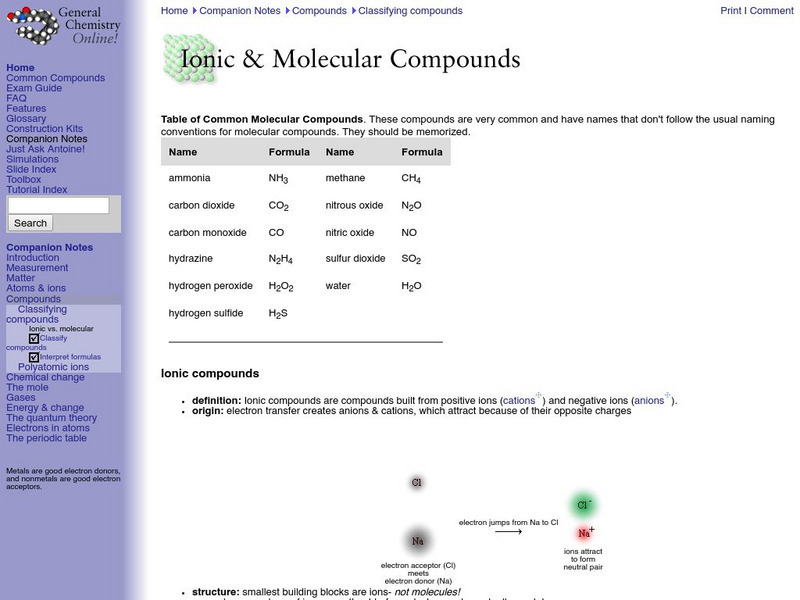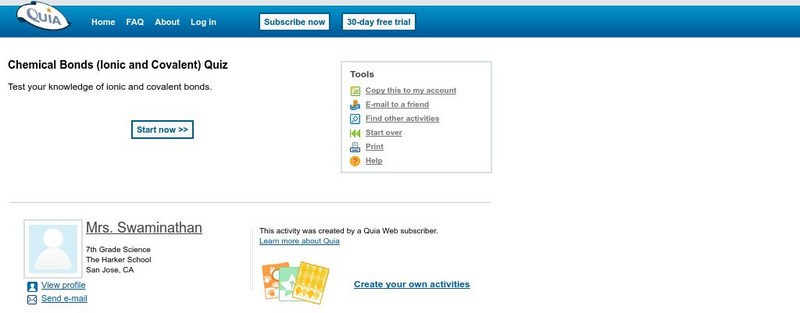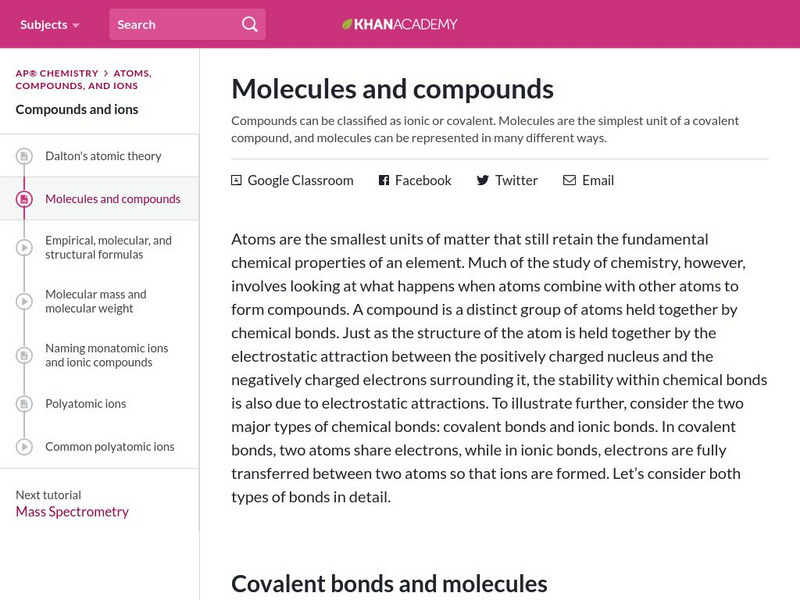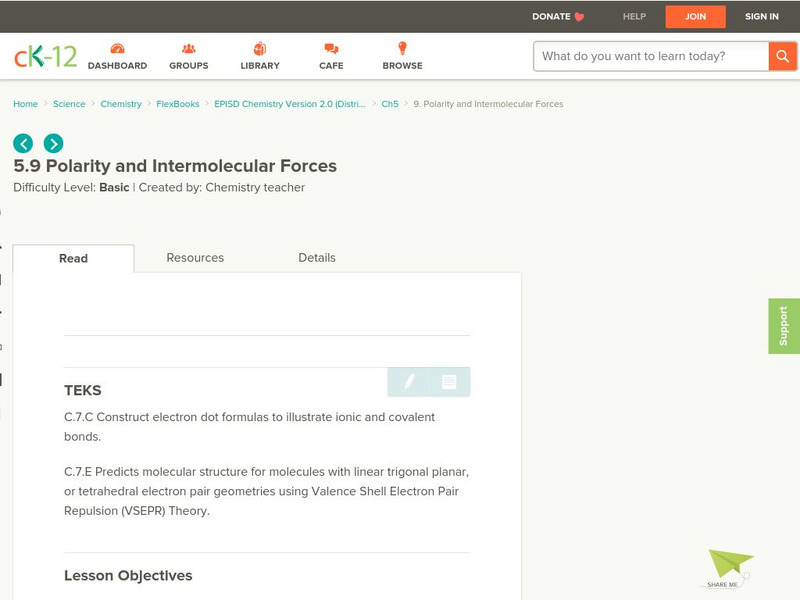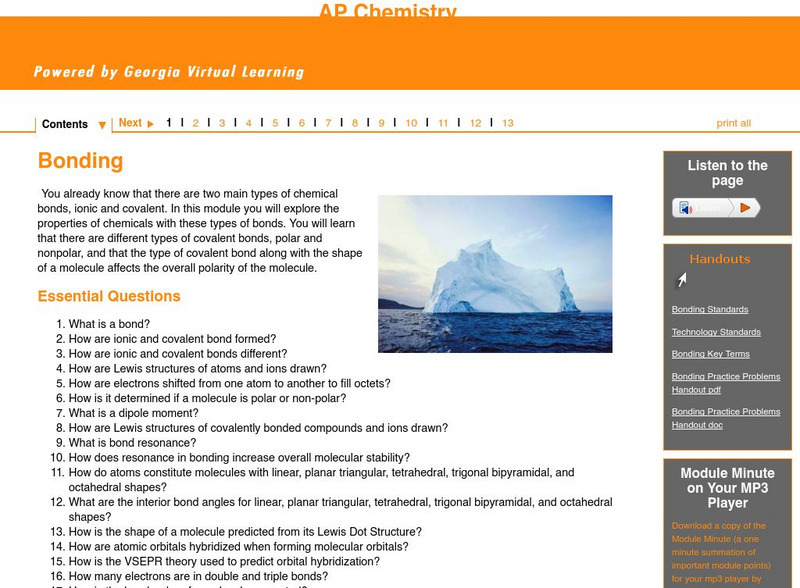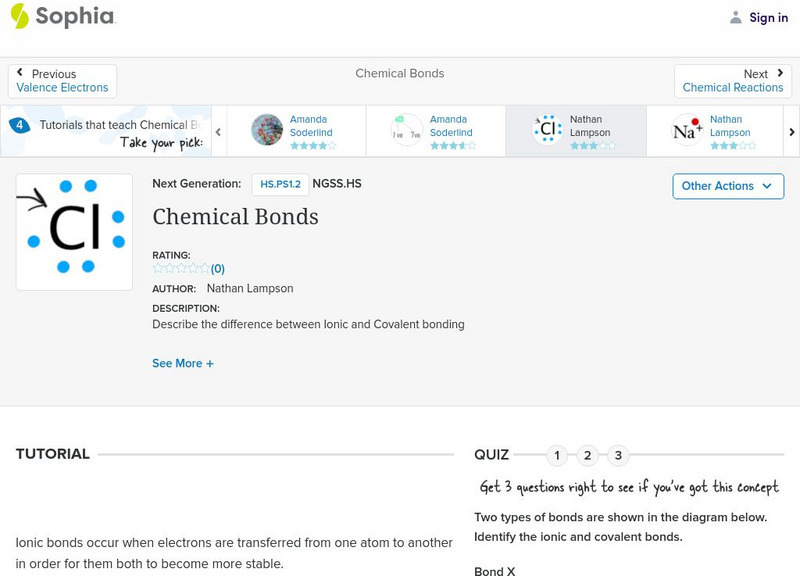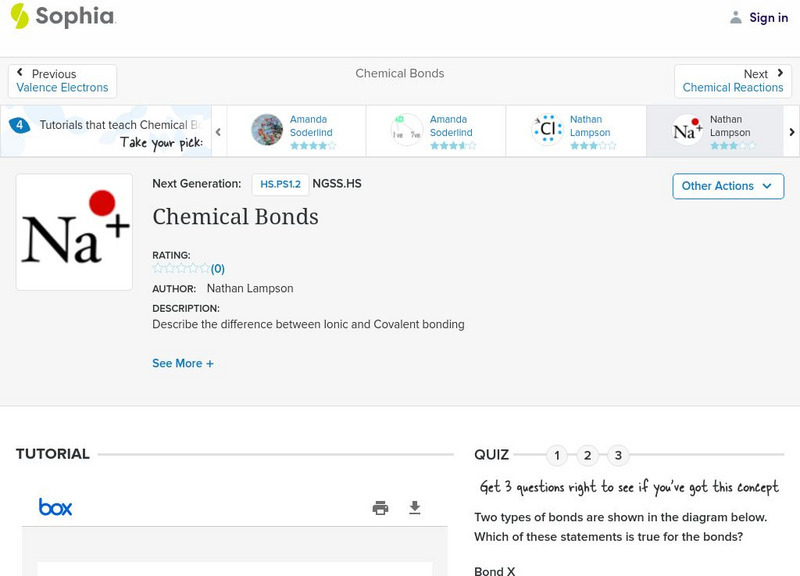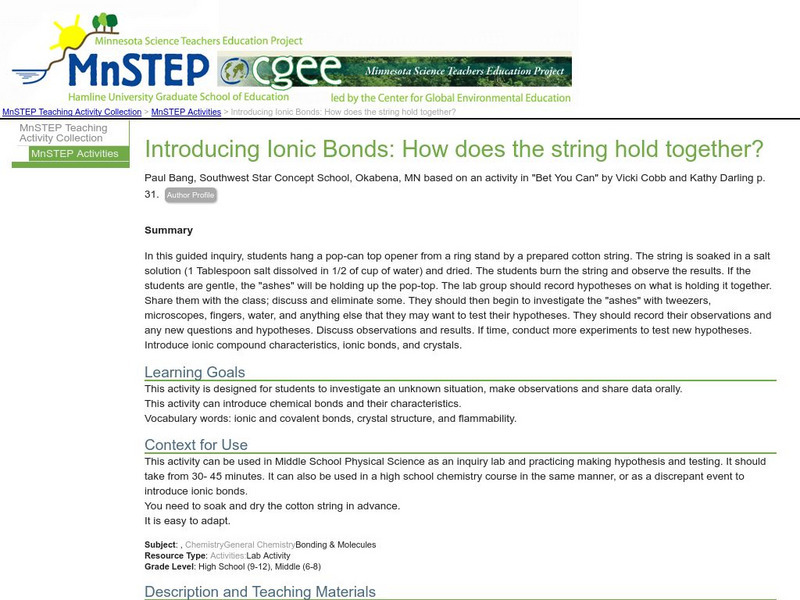Hi, what do you want to do?
Frostburg State University
General Chemistry Online: Ionic and Molecular Compounds
Provides a good outline of the concepts involved in ionic and covalent bonding, with links to definition of terms. Features a list of common molecular compounds and a chart that compares ionic and molecular compounds.
Quia
Quia: Chemical Bonds (Ionic and Covalent) Quiz
This is 21-question multiple choice quiz over chemical bonds was written for a 7th-grade science class.
Georgia Department of Education
Ga Virtual Learning: Physical Science: Bonding and Chemical Reactions
Through informational text, interactive puzzles, and review questions, students differentiate ionic and covalent bonds and identify the properties of each. They also use oxidation numbers to predict formulas of ionic compounds, name...
Chiral Publishing
Chiral Publishing: An Introduction to Chemistry: Compounds and Chemical Bonds: Audio Book
Did you ever wonder how or why atoms bond together? This interactive tutorial sheds some light on why bonds form and the difference between ionic and covalent bonds.
Concord Consortium
Concord Consortium: Stem Resources: Chemical Bonds
By working through this web-based activity, students differentiate between ionic, non-polar covalent, and polar covalent bonds. Specifically, distinctions are made between bonding types based on orbital shapes and electronegativity...
Khan Academy
Khan Academy: Molecules and Compounds
Article defines and explains compounds which are either ionic or covalent and molecules which are the simplest unit of a covalent compound. Molecules can be represented in many different ways.
Quia
Quia: Reading Detective: Main Idea
A 20 question quiz testing knowledge of ionic and covalent bonding.
Science Education Resource Center at Carleton College
Serc: Valence Electrons and Trends in the Periodic Table
This instructor led activity will produce a partially filled periodic table that contains electron-dot models for the first twenty elements in the appropriate boxes. It will be used as a visual tool for students to connect concepts such...
CK-12 Foundation
Ck 12: Polarity and Intermolecular Forces
[Free Registration/Login may be required to access all resource tools.] The following online tutorial describes how the electronegativity difference between two atoms in a covalent bond results in the formation of a nonpolar covalent,...
Utah Education Network
Uen: Conductivity and Bonding
Students will measure the conductivity of several compounds and solutions in order to predict the bond types (ionic or covalent) in the substances tested.
University of Southern California
Atomic Bonds
This slide show on atomic bonds contains several slides on electron affinity. Other topics include covalent, Sigma and Pi bonds, and atomic bonding in solids.
ClassFlow
Class Flow: Ionic & Covalent Compounds
[Free Registration/Login Required] This flipchart presents rules for writing and naming ionic and covalent compounds. There is a short assessment using Activotes.
Georgia Department of Education
Ga Virtual Learning: Ap Chemistry: Bonding
In this module students explore the properties of chemicals with covalent and ionic bonds. Students learn that there are different types of covalent bonds, polar and nonpolar, and that the type of covalent bond along with the shape of a...
Other
All About Covalent Compounds!
Visit this site to find out what covalent compounds are, how covalent bonding is different from ionic bonding, how the properties of covalent compounds differ from ionic compounds, and how to name covalent compounds. There is also a link...
Sophia Learning
Sophia: Chemical Bonds: Lesson 2
Describe the difference between Ionic and Covalent bonding. This lesson is 2 of 5 in the series titled "Chemical Bonds."
Sophia Learning
Sophia: Chemical Bonds: Lesson 5
Describe the difference between Ionic and Covalent bonding. This lesson is 5 of 5 in the series titled "Chemical Bonds."
Ohio State University
Ohio State University: Electronegativity & Bond Polarity
Excellent graphics help this page explain the relationship between electronegativity and bond polarity.
Sophia Learning
Sophia: Ionic Compounds: Naming Compounds With Polyatomic Ions: Lesson 1
This lesson will provide naming rules for ionic compounds containing polyatomic ions and give examples. It is 1 of 2 in the series titled "Ionic Compounds: Naming Compounds with Polyatomic Ions in Formula."
American Chemical Society
Middle School Chemistry: Chapter 4: The Periodic Table and Bonding
Six middle school chemistry lessons about the periodic table and bonding complete with handouts and animations.
Science Education Resource Center at Carleton College
Serc: Introducing Ionic Bonds: How Does the String Hold Together?
This inquiry activity introduces chemical and ionic bonds and allows students to investigate an unknown situation, make hypotheses, and share data.
CK-12 Foundation
Ck 12: Physical Science: Chemical Bond
[Free Registration/Login may be required to access all resource tools.] Definition of a chemical bond, why they form and the different types.
CK-12 Foundation
Ck 12: Chemistry: Chemical Bond
[Free Registration/Login may be required to access all resource tools.] Definition of a chemical bond, why they form and the different types.
Other
University of Texas at Dallas: Attractions in Compounds
Explanation of attractive forces and energy changes involved in bonding.
Utah Education Network
Uen: Grouping Bonds
Young scholars will group a selection of electron dot structures and determine similarities and differences between covalent and ionic bonding.





